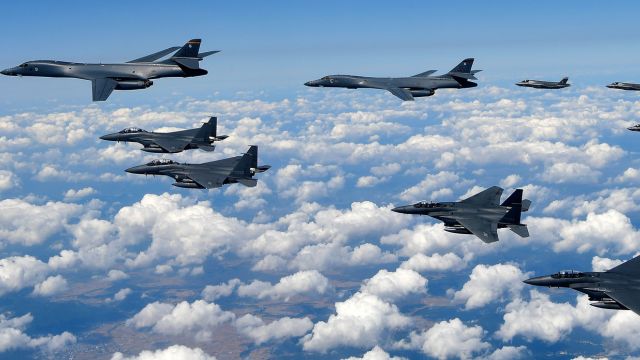South Korea on Thursday scrambled fighter jets after two warplanes from China and about four from Russia briefly entered an air identification zone maintained by Seoul, escalating tensions on the highly militarized peninsula. The Russian and Chinese aircraft were spotted in South Korea’s Air Defence Identification Zone from between 11:53 a.m. and 12:10 p.m. on Thursday, Yonhap News agency reported, citing the Joint Chiefs of Staff. The six planes left the area and did not enter into South Korean airspace, the JCS said, according to Yonhap. The air zone isn’t South Korea’s territorial air space but is an area where aircraft are supposed to identify themselves as they draw near it. The planes flew above waters between South Korea and Japan, the JCS reportedly said, and were in the general vicinity of an island claimed by Seoul and Tokyo. When asked about the incident on Thursday, Chinese Foreign Ministry spokeswoman Mao Ning said at a regular press briefing in Beijing that it was “a routine activity” and “it’s in line with international law.” Earlier in June, four warplanes each from Russia and China entered the area known as KADIZ, prompting South Korea to rush its jets into the air. The flights come as the two Koreas have backed away from a 2018 deal to reduce tensions along their border. After North Korea fired a rocket into space last month that deployed a spy satellite, South Korea restarted surveillance flights it had stopped and North Korea threatened military action against the aircraft. Russia has been trying to enlist North Korea in joint military exercises that include China. During a rare trip to Pyongyang in July, Russian Defence Minister Sergei Shoigu proposed to leader Kim Jong Un that they hold joint naval drills that included China, Yonhap reported, citing South Korea’s spy agency. Kim Jong Un’s state media on Thursday slammed the US, Japan and South Korea for their plan to launch a system this month to share real-time data on missile launches from North Korea, saying the move is pushing the region toward conflict.
South Korea scrambles fighter jets as Russian, Chinese warplanes approach air space
FP Staff
• December 14, 2023, 16:04:08 IST
The Russian and Chinese aircraft were spotted in South Korea’s Air Defence Identification Zone on Thursday. The planes flew above waters between South Korea and Japan and were in the general vicinity of an island claimed by Seoul and Tokyo
Advertisement
)
End of Article